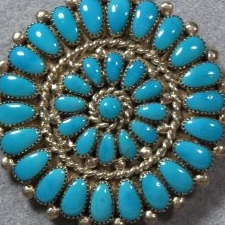The most prized southwestern Native American Indian jewelry is Zuñi. Quality pieces, like turquoise bracelets and necklaces, become heirlooms and are coveted for generations within families. Zuñi jewelry is characterized by stonework – small pieces of stone cut and fashioned in a myriad of designs and stylings (in contrast with Navajo which is mainly large stones placed in a silver setting). The Zuñi tradition of fine Native American Indian jewelry, including turquoise bracelets and necklaces, traces back for many generations. The designs, techniques and styling are passed down through families and often extended to others through marriage. The Zuñi jewelry tradition can even be credited with advancing the art of Zuñi fetish carving. Inlay and fine carving techniques practiced by some carvers can be traced to parents who were jewelers.
Contemporary Zuni Jewelry Galleries
To view these galleries, click on any thumbnail image:

Native American Zuñi jewelry, like turquoise bracelets and necklaces, are divided into three basic design categories – cluster, inlay (channel and flush) and needle-point/petit-point. There are many levels of quality – both in design and craftsmanship. Prices range from low to very high. The major categories in contemporary Native American Indian and Zuñi jewelry are – turquoise bracelets, rings, necklaces (both ‘chokers’ and squash blossoms), pins and pendants. There are also buckles and bolos. Zuñis are famous for the myriad of earring designs and stylings. Zuñi designs are seminal and yet have been copied by many other Native artisans. Most Zuñi artists are now signing or stamping their names or initials on their pieces.

